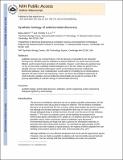Synthetic Biology of Antimicrobial Discovery
Author(s)
Zakeri, Bijan; Lu, Timothy K.
DownloadLu_Synthetic biology.pdf (1.257Mb)
PUBLISHER_POLICY
Publisher Policy
Article is made available in accordance with the publisher's policy and may be subject to US copyright law. Please refer to the publisher's site for terms of use.
Terms of use
Metadata
Show full item recordAbstract
Antibiotic discovery has a storied history. From the discovery of penicillin by Sir Alexander Fleming to the relentless quest for antibiotics by Selman Waksman, the stories have become like folklore used to inspire future generations of scientists. However, recent discovery pipelines have run dry at a time when multidrug-resistant pathogens are on the rise. Nature has proven to be a valuable reservoir of antimicrobial agents, which are primarily produced by modularized biochemical pathways. Such modularization is well suited to remodeling by an interdisciplinary approach that spans science and engineering. Herein, we discuss the biological engineering of small molecules, peptides, and non-traditional antimicrobials and provide an overview of the growing applicability of synthetic biology to antimicrobials discovery.
Date issued
2012-11Department
Massachusetts Institute of Technology. Department of Biological Engineering; Massachusetts Institute of Technology. Department of Electrical Engineering and Computer Science; Massachusetts Institute of Technology. Research Laboratory of Electronics; Massachusetts Institute of Technology. Synthetic Biology CenterJournal
ACS Synthetic Biology
Publisher
American Chemical Society (ACS)
Citation
Zakeri, Bijan, and Timothy K. Lu. “Synthetic Biology of Antimicrobial Discovery.” ACS Synthetic Biology 2, no. 7 (July 19, 2013): 358–372.
Version: Author's final manuscript
ISSN
2161-5063